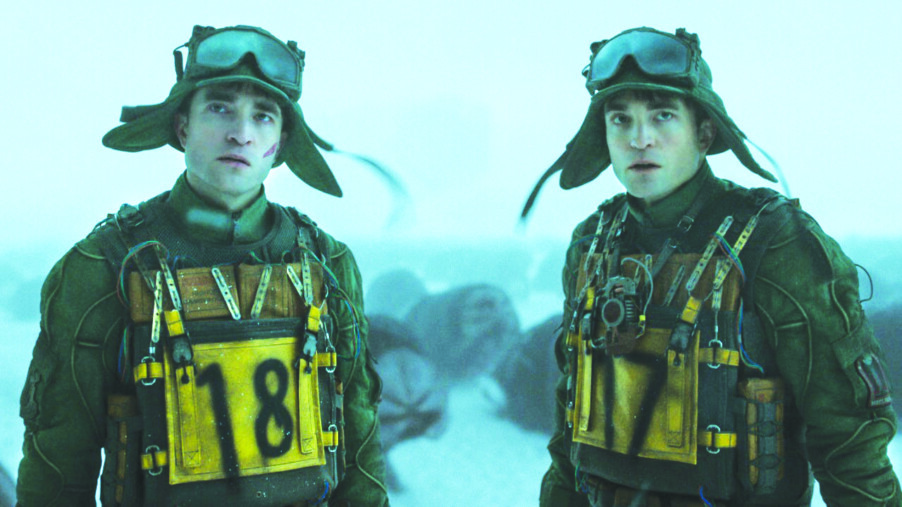Viola Davis is Madame President Bad-ass in G20, which is like Air Force One but radder.
U.S. President Viola Davis — the character’s name is Danielle Sutton but this movie totally supports you thinking “President Viola Davis! Heck yeah! Rock ’n’ roll!” — goes to a G20 summit in South Africa in an attempt to convince world leaders of some plan that supports farmers, particularly in Africa, to end world hunger something something basically she’s being a good guy and we know this in part because British Prime Minister Oliver Everett (Douglas Hodge) is being a real “tut tut well now my dear lady” about it. Meanwhile, she’s dealing with some domestic difficulties — like seriously domestic as her teenage daughter, Serena (Marsai Martin), is sneaking out without her security detail and hacking various systems to do so and just generally being a sassypants in a way that leads to some snide questions from the press. So President Viola Davis decides that Serena and younger brother Demetrius (Christopher Farrar) will accompany her, her husband First Gentleman Anthony Anderson (his character’s name is Derek) and her Treasury Secretary Joanna Worth (Elizabeth Marvel), who was once a presidential rival and has real Hillary vibes, to the summit.
Meanwhile meanwhile, a team of mercenary-types headed by Rutledge (Antony Starr) and his men have infiltrated the security team for the G20 summit. Rutledge has an elaborate plan that goes “something something Deep Fakes something something crash world economy something something cryptocurrency” and also he is bitter about his time in the Australian military during the Iraq war. He takes all the world leaders hostage but in the melee a group manages to escape and hide: President Viola Davis, Secret Service Agent Will Trent (Ramón Rodriguez, his character’s name is actually Manny Ruiz but all I could think is “hey that’s Will Trent from TV’s Will Trent”), the snitty British PM, World Bank lady Elena Romano (Sabrina Impacciatore) and the South Korean first lady (MeeWha Alana Lee), who presents as dignified grandma but is also a bad-ass. They slink around the hotel, getting the drop on various Rutledge henchmen, finding out more about his plan and even rescuing the hotel workers who include two secret agents (Noxolo Dlamini, Theo Bongani Ndyalvane) who help President Viola Davis in her counterstrike plans and about whom her son Demetrius says “you’re from Wakanda” after they balletically take out some baddies.
President Viola Davis starts the evening, pre-hostage-taking, in a stunning tomato-red gown with a cape and some nice heels; later, we get some awesome Buffy the middle-aged Vampire Slayer-style shots of her in sneakers, cape gone, dress torn at the knee for better tactical maneuvering and holding a big ol’ gun. It is chef’s kiss, no notes.
I took zero time to figure out what this movie’s political point of view is, assuming it has one, which it may not; the bad guy plan is unnecessarily complicated, and most of the dialogue is silly or predictable or both. And yet, this movie rocks. It is a total blast for, yes, the fan fiction element of a Viola Davis presidency but also for it just being so much what it is. This is a movie for when you want to watch a person who you believe as a bad-ass do bad-ass things. This is that movie where the Rock fights a building (2018’s Skyscraper), or Gerard Butler does plane (2023’s Plane) or John Wick does anything (all of the John Wicks, 2014-2023). But with Viola Davis. As President. As a serious fil-uhm critic, I think this movie is probably a standard action fare B, maybe even B- for the uncleverness of it all. As a person who watched it and had an excellent time, I think A+, woo-hoo President Woman King! Streaming on Prime Video.
Holland (R)
Nicole Kidman is a strangely square home ec teacher in a suspiciously wholesome town in the thriller/dramady Holland, a movie that doesn’t quite manage to be funny or particularly suspenseful.
Nancy Vandergroot (Kidman) seems like she has an aggressively perfect life with her optometrist/ hobby-train-enthusiast husband Fred (Matthew Macfadyen) and their young son Harry (Jude Hill). But Nancy starts to suspect that Fred’s business trips are just covers for affairs and she gets her work friend Dave Delgado (Gael García Bernal) to help her in a little light PI-ing. But are her suspicions actually a sign of her own unsettled desires, including her obvious attraction to Dave?
I was getting some lady-with-a-screw-loose To Die For energy from Kidman when this movie started and I get the sense that that kind of self-delusion with a dark edge is maybe one of the directions this movie wanted to go with her character. But it goes a lot of other directions with this story too, including one that is super-apparent from the beginning. I think we’re supposed to chuckle at the juxtaposition of the town of Holland, where children learn Dutch dancing and people say “ah sugar” as a form of polite swearing, and the various sins both real and suspected. But the movie treats as dramatic revelations things it basically told us in the beginning and it ultimately makes Nancy kind of a nothing character. I wanted to like this movie for giving Kidman a chance to be kooky. But the movie can’t figure out the vibe it’s going for or the story it wants to tell. C Available on Prime Video.
My Dead Friend Zoe (R)
An Army veteran recently returned to the U.S. from combat abroad is literally haunted by a fallen comrade in My Dead Friend Zoe, a sort of gentle comedy-drama about PTSD from military service.
Merit (Sonequa Martin-Green) stumbles through life, barely participating in court-mandated veteran group therapy run by Dr. Cole (Morgan Freeman) and hitting the road for long runs anytime a situation gets stressful. And through most of her waking hours she is accompanied by Zoe (Natalie Morales), her best friend from her time in the Army. Her dead best friend, as the title indicates. Zoe is mostly there to make snarky comments or bicker with Merit but she also appears to be keeping Merit stuck in a kind of life limbo. Zoe comes with Merit to her grandfather Dale’s (Ed Harris) house to keep an eye on him. Also a veteran, also dealing with stuff, Dale is in the early stages of Alzheimer’s disease and can’t quite manage on his own. Merit’s mother/Dale’s daughter Kris (Gloria Reuben) wants to put Dale in a retirement home and sell his lakeside property to ensure that he’ll have full-time care. Neither Dale nor Merit wants that, but Merit does seem to enjoy meeting Alex (Utakarsh Ambudkar), the retirement home’s director with whom she attempts to go out on a date.
This movie is maybe overly simplistic in the points it’s trying to make but it’s a solid story that gets to issues of friendship and the returned veteran experience that you don’t always see in movies. The chemistry of Martin-Green and Morales is really what holds it together and gives it the charm that makes it worth the watch. B Available for rent or purchase.
The Last Showgirl (R)
Pamela Anderson is a faded dancer in a faded “dancing nudes” show in Las Vegas in The Last Showgirl, a highly watchable movie from Gia Coppola (yes, that Coppola — she is a Francis Ford grandchild).
Shelly (Anderson) is still dazzled by the glamour and showmanship of “Le Razzle Dazzle,” the show she’s been dancing in for some 30 years at a casino in Las Vegas. Not one of the big modern “Adele residency” type venues, we gather — a “dirty circus” has taken the best nights and the Razzle Dazzle is more of a weekday affair at this scruffy locale. The other girls (Brenda Song, Kiernan Shipka are the ones we meet) don’t see it with such stars in their eyes — it’s a job, a job for which they are being paid an ever-shrinking amount (and charged back when a costume rips). Eddie (Dave Bautista), the show’s announcer, informs Shelly and the other women that even that will come to an end soon. Shelly, a 57-year-old woman pretending to be a 42-year-old woman pretending to be 37, isn’t sure what to do next and finds that the dance skills and showmanship that made her (at least in her mind) a star might not be enough to carry her to the next thing. Meanwhile, longtime friend, former dancer and maybe gambling addict Annette (Jamie Lee Curtis), a cocktail waitress who is always on the edge of financial ruin, offers a grim look at the even greater instability Shelly could be facing.
Some of the movie’s best scenes are when Shelly is with Hannah (Billie Lourd), her daughter who we gather has been living with another family and who never quite understood the appeal of the job to Shelly. When Hannah sees the show, she just sees a shabby nudie show with a sparse audience that, for all its down-at-the-heels-ness, her mother still put above her. Lourd’s Carrie Fisher (her real life mother) no-nonsense quality really comes through in these scenes, as does her exhaustion with this person Hannah loves and can’t figure out how to live with. Anderson also gives a strong and highly watchable performance. She captures the slow-motion panic and heartbreak of realizing one phase of life is over and trying to figure out what to do next. B+ Available for rent or purchase.
The Life List (PG-13)
Connie Britton tries to fix her daughter’s life from beyond the grave in The Life List.
When makeup company founder Elizabeth (Britton) dies, she shocks her two sons, two daughters-in-law and her daughter Alex (Sofia Carson) by giving one of the daughters-in-law control of the makeup company instead of Alex, who had been working there. Elizabeth’s will requires Alex to find a new job and fulfill the tasks on her “life list,” a list of goals she made as a young teenager. Some of the items are easy — dance in a mosh pit, get a tattoo — and some are harder, like finding love or repairing her fraught relationship with her dad (José Zúñiga). She dumps the goofy boyfriend her mother felt she’d been settling for and begins a relationship with the cultured Garrett (Sebastian De Souza), who should be the love of her life. But what about her fast friendship with her mother’s lawyer, Brad (Kyle Allen)?
Alex gets a cute apartment, cute potential boyfriends are thick on the ground and finding oneself can be done with relatively minimal financial pain due to a general “from money”-ness. The Life List is a nice if slight young adult fantasy but it has little nuggets of slightly more complex family relationships mixed into all the froth. This movie doesn’t try too hard but it also doesn’t ask too much and it is pleasantly fine. C+ Available on Netflix.
Lee (R)
Photographer Lee Miller gets a biopic with Lee.
We get a relatively interesting look at the life of Lee (Kate Winslet), a model turned photographer who we first meet when she is in her 30s in the 1930s, which, ha no she’s not and actually that’s pretty great. I mean, yes, historical person Lee Miller was in her early 30s in the late 1930s, but Kate Winslet the actress is currently 49 and, while she looks great in this 2024 Oscar hopeful, her Lee Miller looks like a woman in her late 40s. A woman in her late 40s living her life as she pleases, having affairs, being professionally ambitious and pushing into combat photography, which is all very rad but just hits differently and makes for a more interesting but not entirely true-to-history character. It heightens the sense that this Lee Miller has lived more of a life than the slice the movie focuses on and there’s always a sense of why aren’t we seeing more of that.
Anyway, Lee, an American, living in London with artist Roland Penrose (Alexander Skarsgård), works for British Vogue during the early years of the war and eventually tries to get herself sent into Europe to cover the Allied army. She finds a way with the American army, even if she’s still told that women can’t attend this press briefing or go on that mission. She does eventually get herself into the field, often in the company of Davy Scherman (Andy Samberg), a fellow photographer. Together they are some of the first American photographers to photograph the horrors of the Holocaust — box cars full of corpses and a concentration camp full of dead, dying and starving people.
Wikipedia her and you learn that Lee took an artistic as well as journalistic approach to her war photography — a “huh interesting” element that the movie only slightly glances at. There is a lot to her life that is of the “huh, interesting” variety — her modeling, her life as part of the Parisian art world, her marriage before Penrose — that this movie either ignores completely or addresses only slightly. There is a lot of telling over showing here, telling us that Lee had to push through a lot of sexist nonsense to do her job, telling us that she had a difficult relationship with the son we see decades later in the film’s very clunky framing device. This is one of those movies where seeing the real person’s photographs at the end of the movie has more of an impact than the narrative the movie creates around them. Both Kate Winslet and Lee Miller deserve better. C+ Available for rent or purchase and streaming on Hulu.
Firebrand (R)
The “survived” final wife of King Henry VIII gets a heroic biopic in Firebrand, a “doubtful but whatever” story about Katherine Parr’s time as queen.
Katherine (Alicia Vikander) is here the politically and religiously (same thing for the era’s purposes) radical Protestant wife of an ailing, somewhat unhinged Henry (a very vanity-free Jude Law). She has become a mother figure to his two youngest surviving children — Edward (Patrick Buckley) and Elizabeth (Junia Rees) — and is supportive, in a politic way, of the English Bible and prayers at a time when Henry has decreed a return to Latin and his daughter Mary (Patsy Ferran) stands by as a possible future queen who supports a full return to Catholicism. Katherine’s goal, it seems, is to keep from being executed for heresy before Henry dies, perhaps even securing a role as young Edward’s regent. She’s perhaps hoping that her impending widowhood would also allow her to marry longtime romantic interest Thomas Seymour (Sam Riley) — not a great guy, usually, in stories about the teen years of eventual Queen Elizabeth, but this movie stays in Henry’s reign.
The movie itself kicks off with title cards that suggest that history involving women might require some wild speculation, and wildly speculate it does. And I am fine with that — Henry and his wives having been riffed on in so many ways and from so many angles it’s fun to see a story that focuses on Katherine, even if it goes a lot of historically dodgy places. Everybody does a credible enough job for this exercise in historical “what if, who knows.” Perhaps this is more an exercise for Tudor completists but it’s an OK time if that’s you. B- Available for rent or purchase and streaming on Hulu.
Featured Image: G20 (R)






